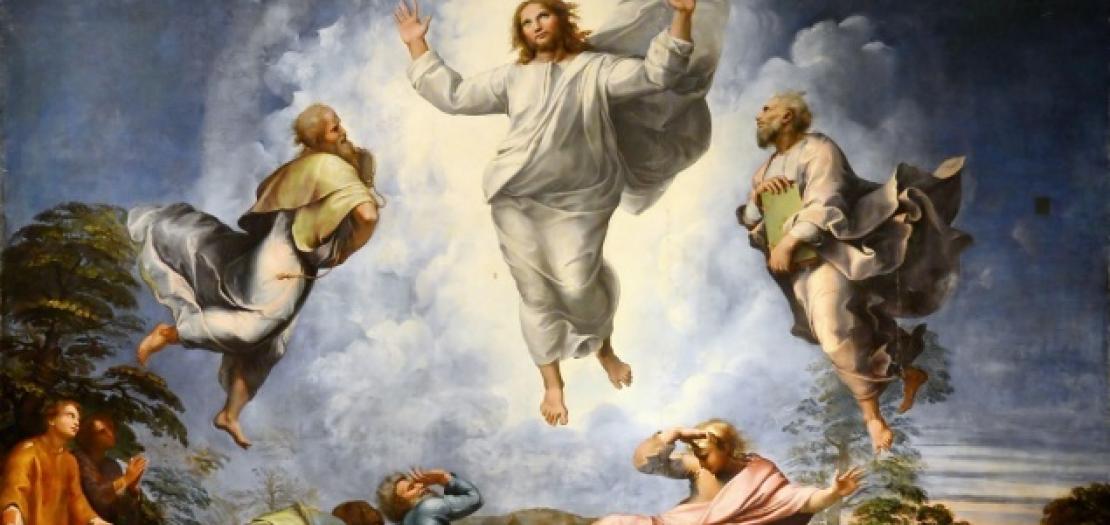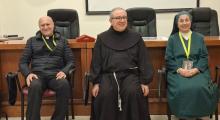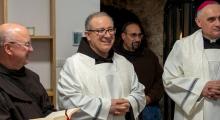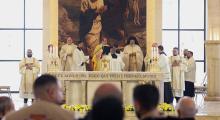Issued by the Catholic Center for Studies and Media - Jordan. Editor-in-chief Fr. Rif'at Bader - موقع أبونا abouna.org

Following is the meditation of Latin Patriarch of Jerusalem His Beatitude Pierbattista Pizzaballa for the Second Sunday of Lent, Year B, February 28, 2021:
The Transfiguration event is part of the way of formation in understanding the actual messianic mission that Jesus is carrying out with His disciples. Jesus, we would say today, gives His disciples teaching on His messianic character and the Passover. Just six days earlier (Mk 9:20), sure enough, Jesus spoke with them, for the first time, of the death on the cross that He would suffer in Jerusalem (Mk 8:31). Later, He also explained the conditions that make a disciple fit to follow Jesus what should be: “If anyone wants to come after me, let him deny himself, take up his cross and follow me” (Mk 8:34).
But He does not only speak to them about the cross: formation like this would be incomplete. On Tabor, transfigured and resplendent in glory, Jesus also speaks about the resurrection to His disciples, and announces to them, not in words but with an event of light, that the cross has as its outcome not a definitive failure, but the passage to glory, to the life of the Father. In the nearness of the passion, Jesus prepares the disciples and does it by showing them a foretaste of glory, so that they may not be scandalized by the Cross.
But is it only this? Does Jesus’ catechesis on the Passover result in a greater understanding by the disciples? Does it prevent their scandal, betrayal, denial, escape, shame? Will the memory of the Tabor experience preserve them from fear? Actually, no.
The Transfiguration, like the announcement of the Passion, does not serve to prevent the scandal of the Cross for the disciples, it is not so strong an experience as to make them capable of being with Jesus to the end. Despite the three announcements of the passion, despite the transfiguration, all the disciples, under the Cross, measure their inability to follow their Master, and their failure to be disciples who can deny themselves. The betray (Mk 14:43), they flee (Mk 14:50), and even deny (Mk 14:72), as we know this opens us up to two further understandings.
The first is that in reality, as they had not understood the announcement of the Passion, so now, the disciples understand almost nothing of the experience of the Transfiguration (Mk 9: 6,10). And this, not because they are obtuse but because at the heart of the faith in which the disciples are walking there is something that human ability alone cannot understand, something that goes beyond the personal categories that the disciples possess to interpret life. We cannot comprehend the cross, the Passover, by using an instruction as if it were something to know as if it were information to listen to a few times to understand it.
The disciples, to fully understand the Passover, will instead have to experience their failure, their lack of understanding, even though during their ministry they were somehow prepared by the discourses of Jesus. Only after becoming aware of their failures, their betrayal, will they be able to go over again the journey made with Jesus and remember all with a new recall that changes a life, and that gives the key to events.
But only the Holy Spirit could bring about this passage (Jn 14:26) until the real Face of the Lord, crucified and risen, is engraved in the hearts.
The second understanding is that the Transfiguration – which did serve to support the disciples’ loyalty – is an entirely free moment of the life of Jesus and His relationship with them: Jesus merely shows them the Life, shows that the authentic life is humanity clothed in glory, inhabited by God. This Life is created and given by the Father.
It is the Father Who intervenes at that moment on Tabor, to put His seal, to say that this full and beautiful life comes only from Him. There is no transfiguration without the Father because the new life that shines in Jesus is the life of sons: “This is my Son, the beloved” (Mk 9:7).
On the night of Easter, the Church will baptize many children and adults; it will create a new life in new sons: will give them this life, what we see today shining in Jesus: which the Church itself received from the pierced side of the Lord, that of sons who lose themselves in love. And these new sons will be clothed with a white garment, just like Jesus on Tabor.
From what is happening before his eyes, Peter understands only this: that it is “good” (Mk 9:5) and therefore the desire arises to stay there, to settle there. The way of remaining there, however, is not to make three tents. The Father states the way: “Listen to Him” (Mk 9:7).
“You must listen to him” is the prophecy that a new Moses was promised to Israel (Dt 18:15). Listen to Him only (Mk 9:8); the Lord is the way of the new freedom, of the new and definitive Paschal Mystery.
+Pierbattista







